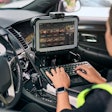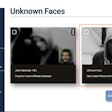With much fanfare, Verizon launched its next-gen wireless network Sunday — a first-release 4G wireless broadband using 3GPP Long Term Evolution (LTE) technology.
Data-hungry consumers and technology boosters are greeting the next-gen networks enthusiastically, yet some caution needs to be in play. Verizon is currently offering only one device that utilizes the new network, a laptop modem from LG.
Law enforcement agencies are also anticipating next-gen networks to deploy or expand municipal surveillance networks (if budgets allow). Connected cameras will help patrol officers work more seamlessly with central command centers to apprehend fleeing suspects and halt crimes in progress.
This just won't be happening right away, whether agencies are customers of Verizon, Sprint or another carrier.
With the launch in 39 U.S. cities and at 62 airports, Verizon is redeploying segments of 700 Mhz frequency spectrum once used for UHF television stations.
Earlier this year, Sprint went live with its next-gen platform, called WiMAX, that's capable of speeds ranging from 3 Mbps to 10 Mbps. Then, T-Mobile launched its network later bolstered to 3G-HSPA+ and offering 5 Mbps to 12 Mbps. AT&T is expected to unveil its network in 2011. Verizon's network will average 5 Mbps to 12 Mbps, reports CNN Money.
The Los Angeles Police Department, a Sprint customer, will transition from 3G to 4G "several years from now," Capt. Regina Scott tells POLICE Magazine.
"Verizon going to 4G has no negative impact on our department," said Capt. Scott of the LAPD's information technology bureau. "They [Sprint] still have a lot of infrastructure to build out before they can completely convert. The only impact the faster network system will have will be a positive one, because it will give us faster and more efficient data transfer."
An agency such at the Baltimore Police Department, a Verizon customer, may see more immediate results of the upgrade, because its patrol officers have all been issued Blackberry smartphones with PocketCop software that allows officers to access NCIC, run warrants and check driver's license photos.
"With the evolution of 4G, it's only a mater of time that devices with the PocketCop will upgrade to 4G and increase the efficiency of officers on the street who are using those devices," Baltimore PD's chief spokesman Anthony Guglielmi tells POLICE Magazine.
Baltimore had deployed one of the largest video surveillance networks in the country, called City Watch, with some 500 wired cameras sending feeds to the City Watch control center. A next-gen broadband network would allow the agency to add wireless cameras when expanding or replacing older equipment.
Also, the agency is one of only a few that uses the USTREAM live-streaming service to broadcast press conferences and on-scene department announcements via the internet.














